Business Law: Selection of Business Structure and Directors' Duties
VerifiedAdded on 2023/06/11
|10
|2927
|469
AI Summary
This article discusses the selection of business structure for a proposed venture and the duties of directors in corporate governance. It compares different business structures available in Australia and explains why a proprietary company limited by shares is the most suitable for the proposed venture. It also outlines the duties of directors as set out in the Corporation Act 2001 (Cth) and their importance in ensuring good corporate governance. The article emphasizes the need for directors to act in the best interest of the company and balance the stakeholders' interests.
Contribute Materials
Your contribution can guide someone’s learning journey. Share your
documents today.
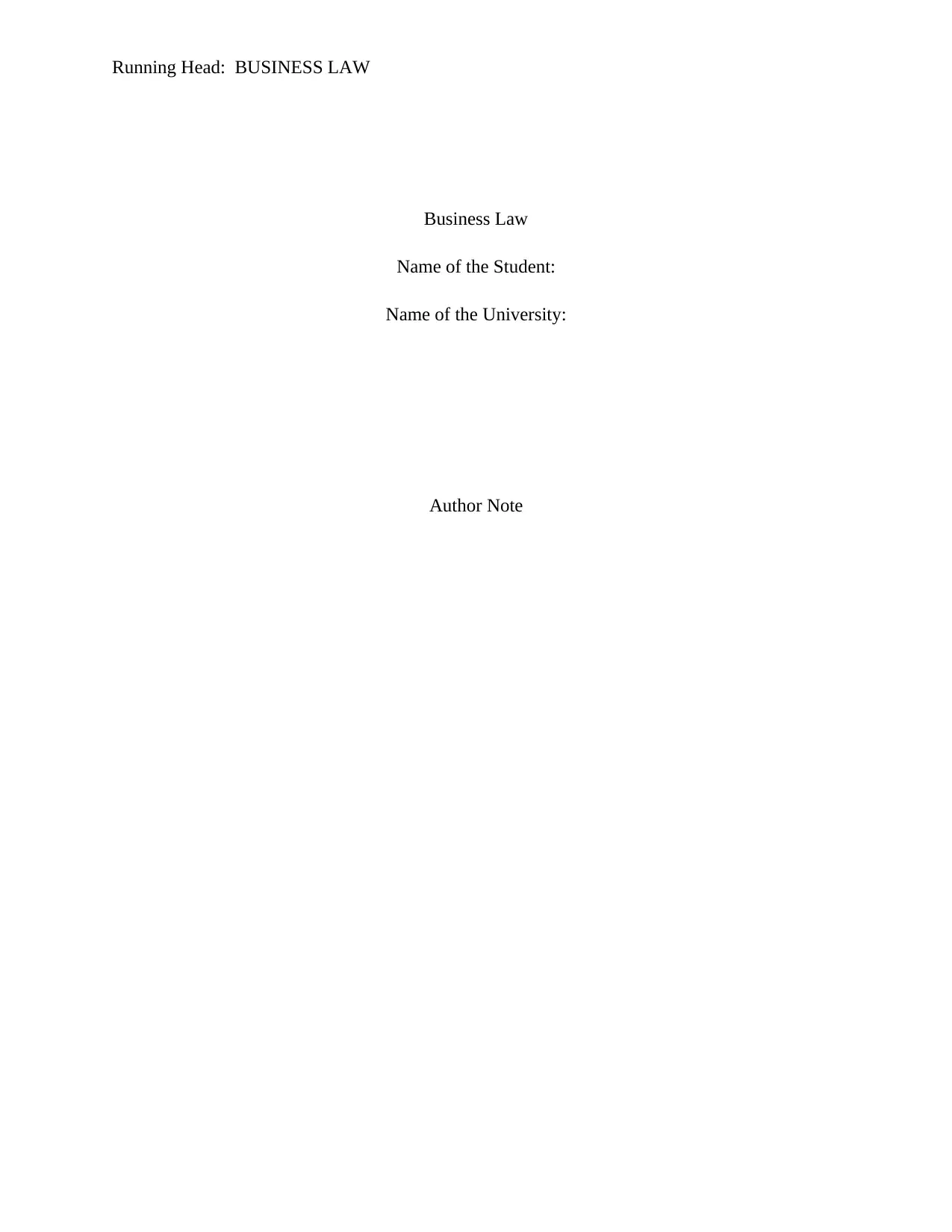
Running Head: BUSINESS LAW
Business Law
Name of the Student:
Name of the University:
Author Note
Business Law
Name of the Student:
Name of the University:
Author Note
Secure Best Marks with AI Grader
Need help grading? Try our AI Grader for instant feedback on your assignments.
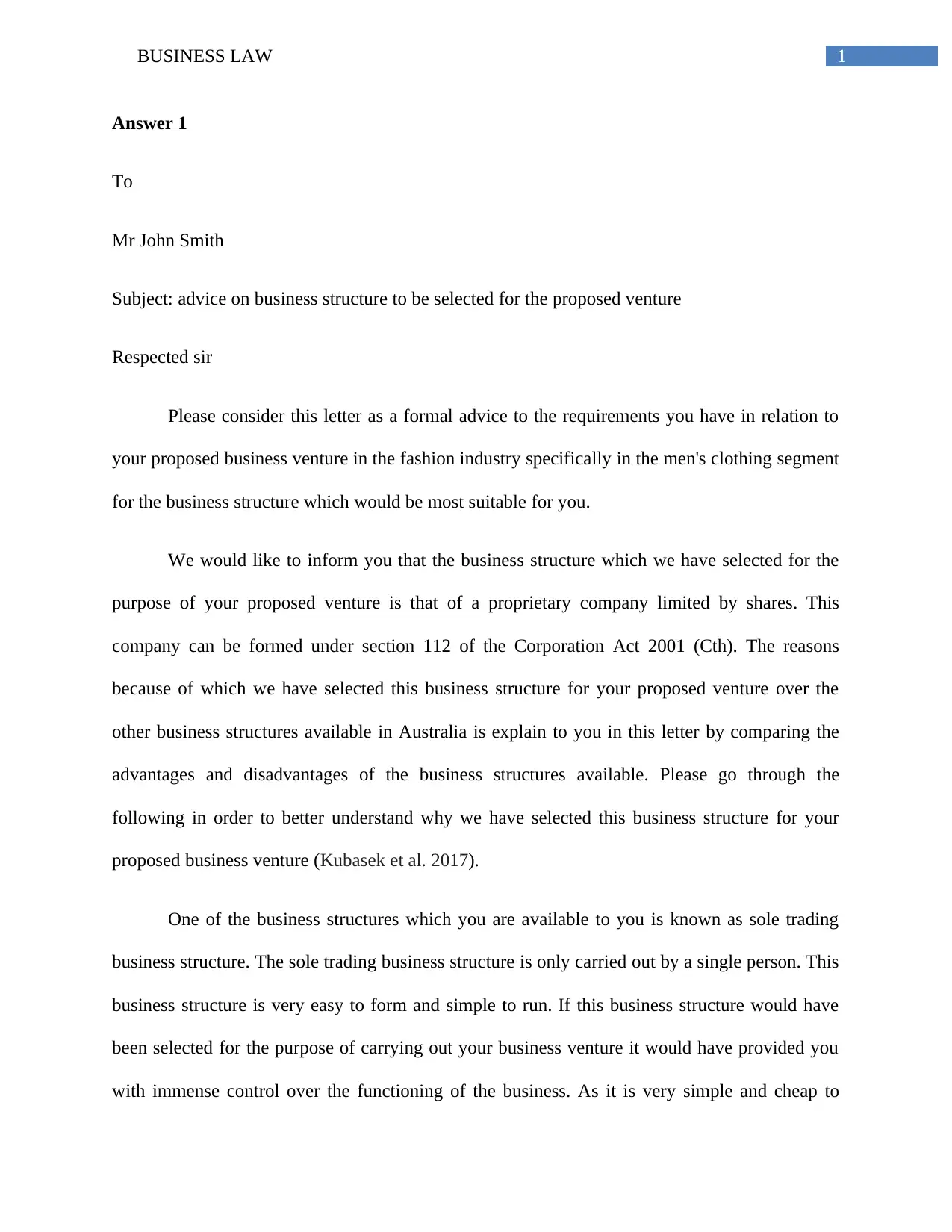
1BUSINESS LAW
Answer 1
To
Mr John Smith
Subject: advice on business structure to be selected for the proposed venture
Respected sir
Please consider this letter as a formal advice to the requirements you have in relation to
your proposed business venture in the fashion industry specifically in the men's clothing segment
for the business structure which would be most suitable for you.
We would like to inform you that the business structure which we have selected for the
purpose of your proposed venture is that of a proprietary company limited by shares. This
company can be formed under section 112 of the Corporation Act 2001 (Cth). The reasons
because of which we have selected this business structure for your proposed venture over the
other business structures available in Australia is explain to you in this letter by comparing the
advantages and disadvantages of the business structures available. Please go through the
following in order to better understand why we have selected this business structure for your
proposed business venture (Kubasek et al. 2017).
One of the business structures which you are available to you is known as sole trading
business structure. The sole trading business structure is only carried out by a single person. This
business structure is very easy to form and simple to run. If this business structure would have
been selected for the purpose of carrying out your business venture it would have provided you
with immense control over the functioning of the business. As it is very simple and cheap to
Answer 1
To
Mr John Smith
Subject: advice on business structure to be selected for the proposed venture
Respected sir
Please consider this letter as a formal advice to the requirements you have in relation to
your proposed business venture in the fashion industry specifically in the men's clothing segment
for the business structure which would be most suitable for you.
We would like to inform you that the business structure which we have selected for the
purpose of your proposed venture is that of a proprietary company limited by shares. This
company can be formed under section 112 of the Corporation Act 2001 (Cth). The reasons
because of which we have selected this business structure for your proposed venture over the
other business structures available in Australia is explain to you in this letter by comparing the
advantages and disadvantages of the business structures available. Please go through the
following in order to better understand why we have selected this business structure for your
proposed business venture (Kubasek et al. 2017).
One of the business structures which you are available to you is known as sole trading
business structure. The sole trading business structure is only carried out by a single person. This
business structure is very easy to form and simple to run. If this business structure would have
been selected for the purpose of carrying out your business venture it would have provided you
with immense control over the functioning of the business. As it is very simple and cheap to
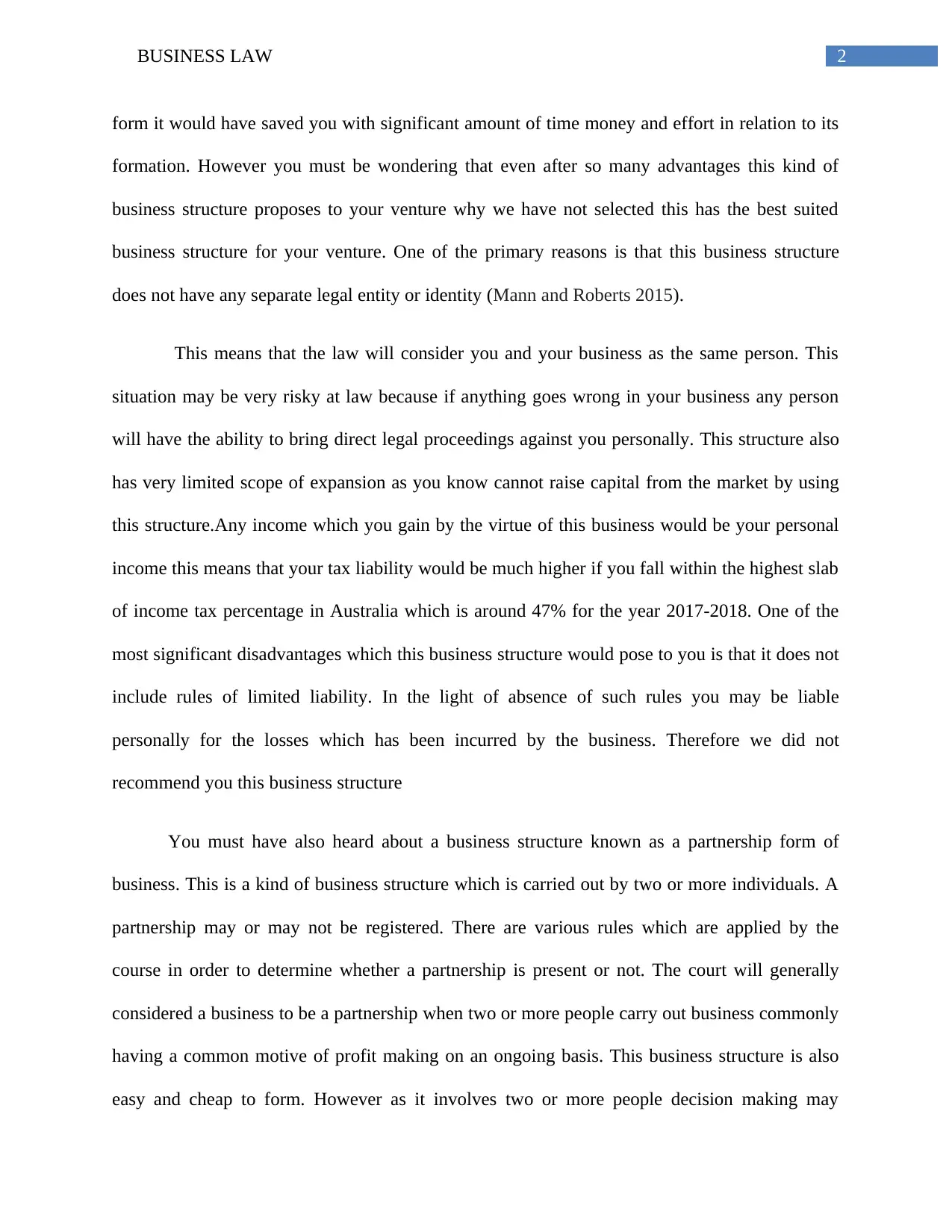
2BUSINESS LAW
form it would have saved you with significant amount of time money and effort in relation to its
formation. However you must be wondering that even after so many advantages this kind of
business structure proposes to your venture why we have not selected this has the best suited
business structure for your venture. One of the primary reasons is that this business structure
does not have any separate legal entity or identity (Mann and Roberts 2015).
This means that the law will consider you and your business as the same person. This
situation may be very risky at law because if anything goes wrong in your business any person
will have the ability to bring direct legal proceedings against you personally. This structure also
has very limited scope of expansion as you know cannot raise capital from the market by using
this structure.Any income which you gain by the virtue of this business would be your personal
income this means that your tax liability would be much higher if you fall within the highest slab
of income tax percentage in Australia which is around 47% for the year 2017-2018. One of the
most significant disadvantages which this business structure would pose to you is that it does not
include rules of limited liability. In the light of absence of such rules you may be liable
personally for the losses which has been incurred by the business. Therefore we did not
recommend you this business structure
You must have also heard about a business structure known as a partnership form of
business. This is a kind of business structure which is carried out by two or more individuals. A
partnership may or may not be registered. There are various rules which are applied by the
course in order to determine whether a partnership is present or not. The court will generally
considered a business to be a partnership when two or more people carry out business commonly
having a common motive of profit making on an ongoing basis. This business structure is also
easy and cheap to form. However as it involves two or more people decision making may
form it would have saved you with significant amount of time money and effort in relation to its
formation. However you must be wondering that even after so many advantages this kind of
business structure proposes to your venture why we have not selected this has the best suited
business structure for your venture. One of the primary reasons is that this business structure
does not have any separate legal entity or identity (Mann and Roberts 2015).
This means that the law will consider you and your business as the same person. This
situation may be very risky at law because if anything goes wrong in your business any person
will have the ability to bring direct legal proceedings against you personally. This structure also
has very limited scope of expansion as you know cannot raise capital from the market by using
this structure.Any income which you gain by the virtue of this business would be your personal
income this means that your tax liability would be much higher if you fall within the highest slab
of income tax percentage in Australia which is around 47% for the year 2017-2018. One of the
most significant disadvantages which this business structure would pose to you is that it does not
include rules of limited liability. In the light of absence of such rules you may be liable
personally for the losses which has been incurred by the business. Therefore we did not
recommend you this business structure
You must have also heard about a business structure known as a partnership form of
business. This is a kind of business structure which is carried out by two or more individuals. A
partnership may or may not be registered. There are various rules which are applied by the
course in order to determine whether a partnership is present or not. The court will generally
considered a business to be a partnership when two or more people carry out business commonly
having a common motive of profit making on an ongoing basis. This business structure is also
easy and cheap to form. However as it involves two or more people decision making may
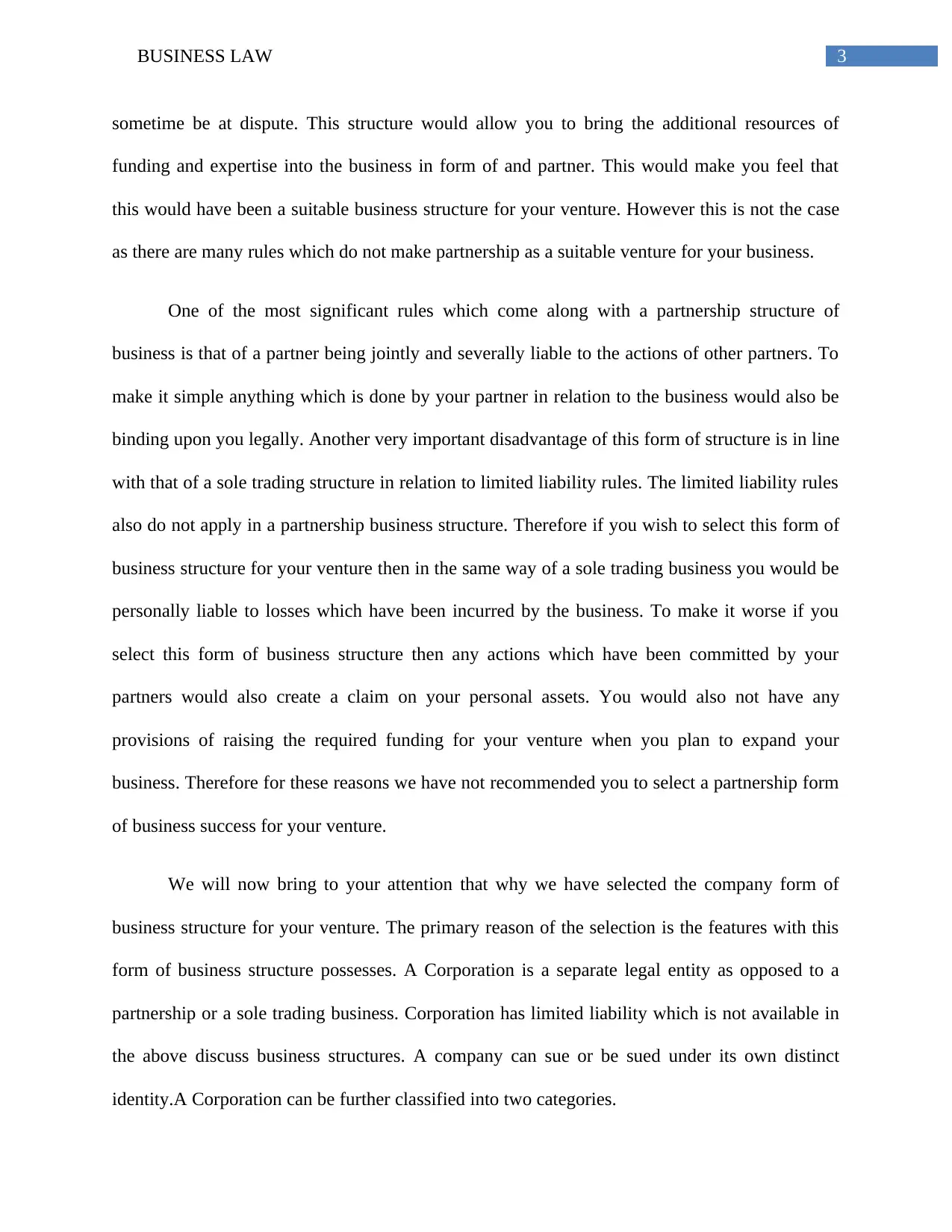
3BUSINESS LAW
sometime be at dispute. This structure would allow you to bring the additional resources of
funding and expertise into the business in form of and partner. This would make you feel that
this would have been a suitable business structure for your venture. However this is not the case
as there are many rules which do not make partnership as a suitable venture for your business.
One of the most significant rules which come along with a partnership structure of
business is that of a partner being jointly and severally liable to the actions of other partners. To
make it simple anything which is done by your partner in relation to the business would also be
binding upon you legally. Another very important disadvantage of this form of structure is in line
with that of a sole trading structure in relation to limited liability rules. The limited liability rules
also do not apply in a partnership business structure. Therefore if you wish to select this form of
business structure for your venture then in the same way of a sole trading business you would be
personally liable to losses which have been incurred by the business. To make it worse if you
select this form of business structure then any actions which have been committed by your
partners would also create a claim on your personal assets. You would also not have any
provisions of raising the required funding for your venture when you plan to expand your
business. Therefore for these reasons we have not recommended you to select a partnership form
of business success for your venture.
We will now bring to your attention that why we have selected the company form of
business structure for your venture. The primary reason of the selection is the features with this
form of business structure possesses. A Corporation is a separate legal entity as opposed to a
partnership or a sole trading business. Corporation has limited liability which is not available in
the above discuss business structures. A company can sue or be sued under its own distinct
identity.A Corporation can be further classified into two categories.
sometime be at dispute. This structure would allow you to bring the additional resources of
funding and expertise into the business in form of and partner. This would make you feel that
this would have been a suitable business structure for your venture. However this is not the case
as there are many rules which do not make partnership as a suitable venture for your business.
One of the most significant rules which come along with a partnership structure of
business is that of a partner being jointly and severally liable to the actions of other partners. To
make it simple anything which is done by your partner in relation to the business would also be
binding upon you legally. Another very important disadvantage of this form of structure is in line
with that of a sole trading structure in relation to limited liability rules. The limited liability rules
also do not apply in a partnership business structure. Therefore if you wish to select this form of
business structure for your venture then in the same way of a sole trading business you would be
personally liable to losses which have been incurred by the business. To make it worse if you
select this form of business structure then any actions which have been committed by your
partners would also create a claim on your personal assets. You would also not have any
provisions of raising the required funding for your venture when you plan to expand your
business. Therefore for these reasons we have not recommended you to select a partnership form
of business success for your venture.
We will now bring to your attention that why we have selected the company form of
business structure for your venture. The primary reason of the selection is the features with this
form of business structure possesses. A Corporation is a separate legal entity as opposed to a
partnership or a sole trading business. Corporation has limited liability which is not available in
the above discuss business structures. A company can sue or be sued under its own distinct
identity.A Corporation can be further classified into two categories.
Secure Best Marks with AI Grader
Need help grading? Try our AI Grader for instant feedback on your assignments.
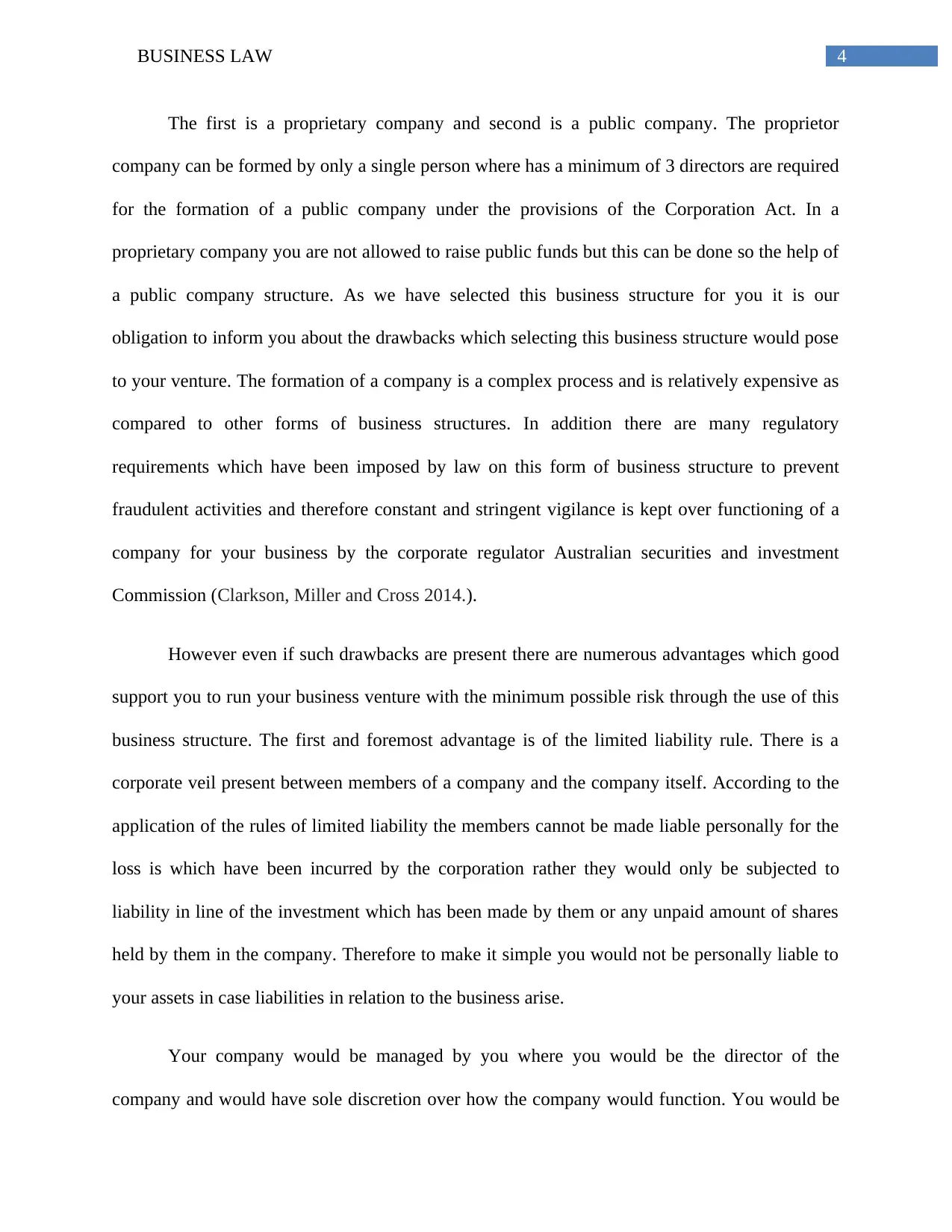
4BUSINESS LAW
The first is a proprietary company and second is a public company. The proprietor
company can be formed by only a single person where has a minimum of 3 directors are required
for the formation of a public company under the provisions of the Corporation Act. In a
proprietary company you are not allowed to raise public funds but this can be done so the help of
a public company structure. As we have selected this business structure for you it is our
obligation to inform you about the drawbacks which selecting this business structure would pose
to your venture. The formation of a company is a complex process and is relatively expensive as
compared to other forms of business structures. In addition there are many regulatory
requirements which have been imposed by law on this form of business structure to prevent
fraudulent activities and therefore constant and stringent vigilance is kept over functioning of a
company for your business by the corporate regulator Australian securities and investment
Commission (Clarkson, Miller and Cross 2014.).
However even if such drawbacks are present there are numerous advantages which good
support you to run your business venture with the minimum possible risk through the use of this
business structure. The first and foremost advantage is of the limited liability rule. There is a
corporate veil present between members of a company and the company itself. According to the
application of the rules of limited liability the members cannot be made liable personally for the
loss is which have been incurred by the corporation rather they would only be subjected to
liability in line of the investment which has been made by them or any unpaid amount of shares
held by them in the company. Therefore to make it simple you would not be personally liable to
your assets in case liabilities in relation to the business arise.
Your company would be managed by you where you would be the director of the
company and would have sole discretion over how the company would function. You would be
The first is a proprietary company and second is a public company. The proprietor
company can be formed by only a single person where has a minimum of 3 directors are required
for the formation of a public company under the provisions of the Corporation Act. In a
proprietary company you are not allowed to raise public funds but this can be done so the help of
a public company structure. As we have selected this business structure for you it is our
obligation to inform you about the drawbacks which selecting this business structure would pose
to your venture. The formation of a company is a complex process and is relatively expensive as
compared to other forms of business structures. In addition there are many regulatory
requirements which have been imposed by law on this form of business structure to prevent
fraudulent activities and therefore constant and stringent vigilance is kept over functioning of a
company for your business by the corporate regulator Australian securities and investment
Commission (Clarkson, Miller and Cross 2014.).
However even if such drawbacks are present there are numerous advantages which good
support you to run your business venture with the minimum possible risk through the use of this
business structure. The first and foremost advantage is of the limited liability rule. There is a
corporate veil present between members of a company and the company itself. According to the
application of the rules of limited liability the members cannot be made liable personally for the
loss is which have been incurred by the corporation rather they would only be subjected to
liability in line of the investment which has been made by them or any unpaid amount of shares
held by them in the company. Therefore to make it simple you would not be personally liable to
your assets in case liabilities in relation to the business arise.
Your company would be managed by you where you would be the director of the
company and would have sole discretion over how the company would function. You would be
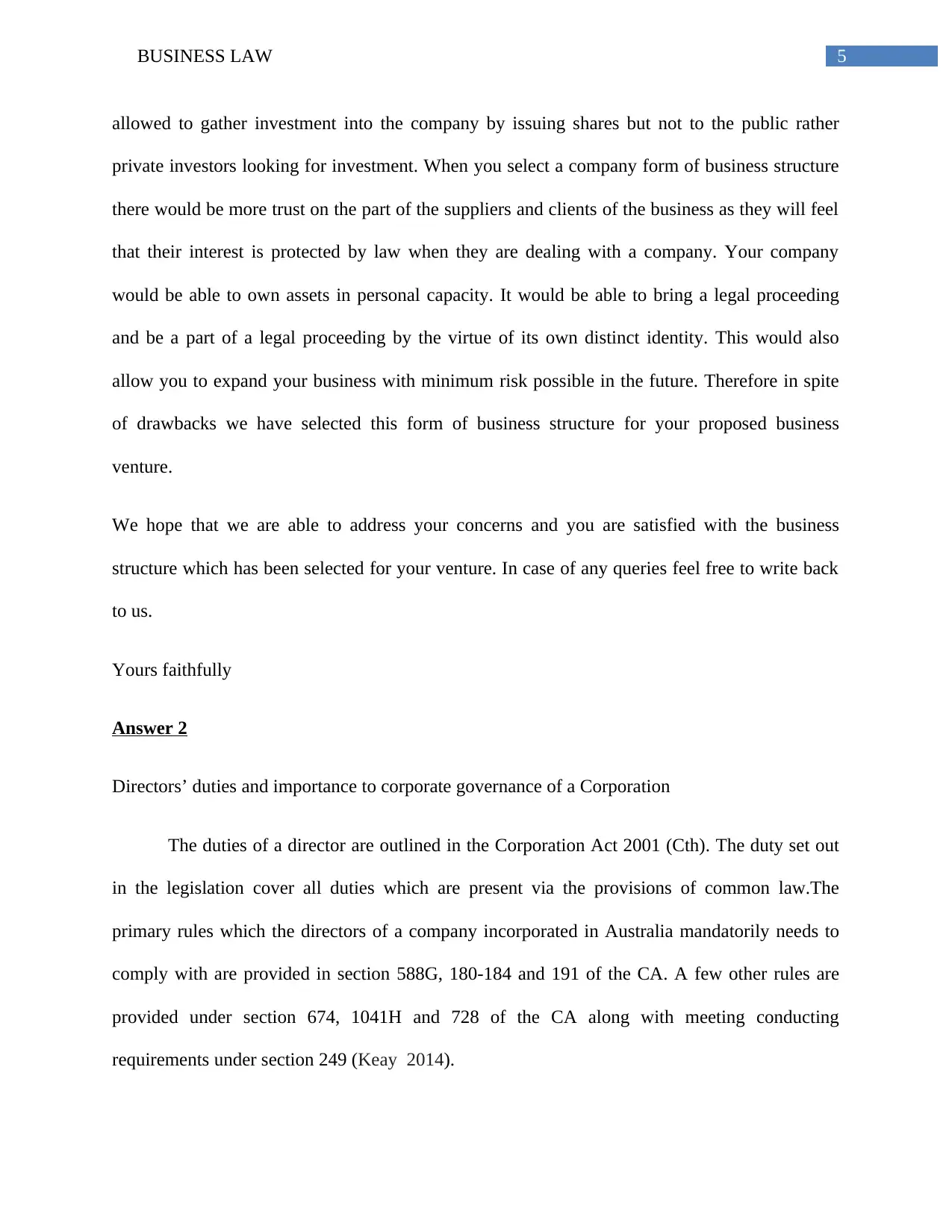
5BUSINESS LAW
allowed to gather investment into the company by issuing shares but not to the public rather
private investors looking for investment. When you select a company form of business structure
there would be more trust on the part of the suppliers and clients of the business as they will feel
that their interest is protected by law when they are dealing with a company. Your company
would be able to own assets in personal capacity. It would be able to bring a legal proceeding
and be a part of a legal proceeding by the virtue of its own distinct identity. This would also
allow you to expand your business with minimum risk possible in the future. Therefore in spite
of drawbacks we have selected this form of business structure for your proposed business
venture.
We hope that we are able to address your concerns and you are satisfied with the business
structure which has been selected for your venture. In case of any queries feel free to write back
to us.
Yours faithfully
Answer 2
Directors’ duties and importance to corporate governance of a Corporation
The duties of a director are outlined in the Corporation Act 2001 (Cth). The duty set out
in the legislation cover all duties which are present via the provisions of common law.The
primary rules which the directors of a company incorporated in Australia mandatorily needs to
comply with are provided in section 588G, 180-184 and 191 of the CA. A few other rules are
provided under section 674, 1041H and 728 of the CA along with meeting conducting
requirements under section 249 (Keay 2014).
allowed to gather investment into the company by issuing shares but not to the public rather
private investors looking for investment. When you select a company form of business structure
there would be more trust on the part of the suppliers and clients of the business as they will feel
that their interest is protected by law when they are dealing with a company. Your company
would be able to own assets in personal capacity. It would be able to bring a legal proceeding
and be a part of a legal proceeding by the virtue of its own distinct identity. This would also
allow you to expand your business with minimum risk possible in the future. Therefore in spite
of drawbacks we have selected this form of business structure for your proposed business
venture.
We hope that we are able to address your concerns and you are satisfied with the business
structure which has been selected for your venture. In case of any queries feel free to write back
to us.
Yours faithfully
Answer 2
Directors’ duties and importance to corporate governance of a Corporation
The duties of a director are outlined in the Corporation Act 2001 (Cth). The duty set out
in the legislation cover all duties which are present via the provisions of common law.The
primary rules which the directors of a company incorporated in Australia mandatorily needs to
comply with are provided in section 588G, 180-184 and 191 of the CA. A few other rules are
provided under section 674, 1041H and 728 of the CA along with meeting conducting
requirements under section 249 (Keay 2014).
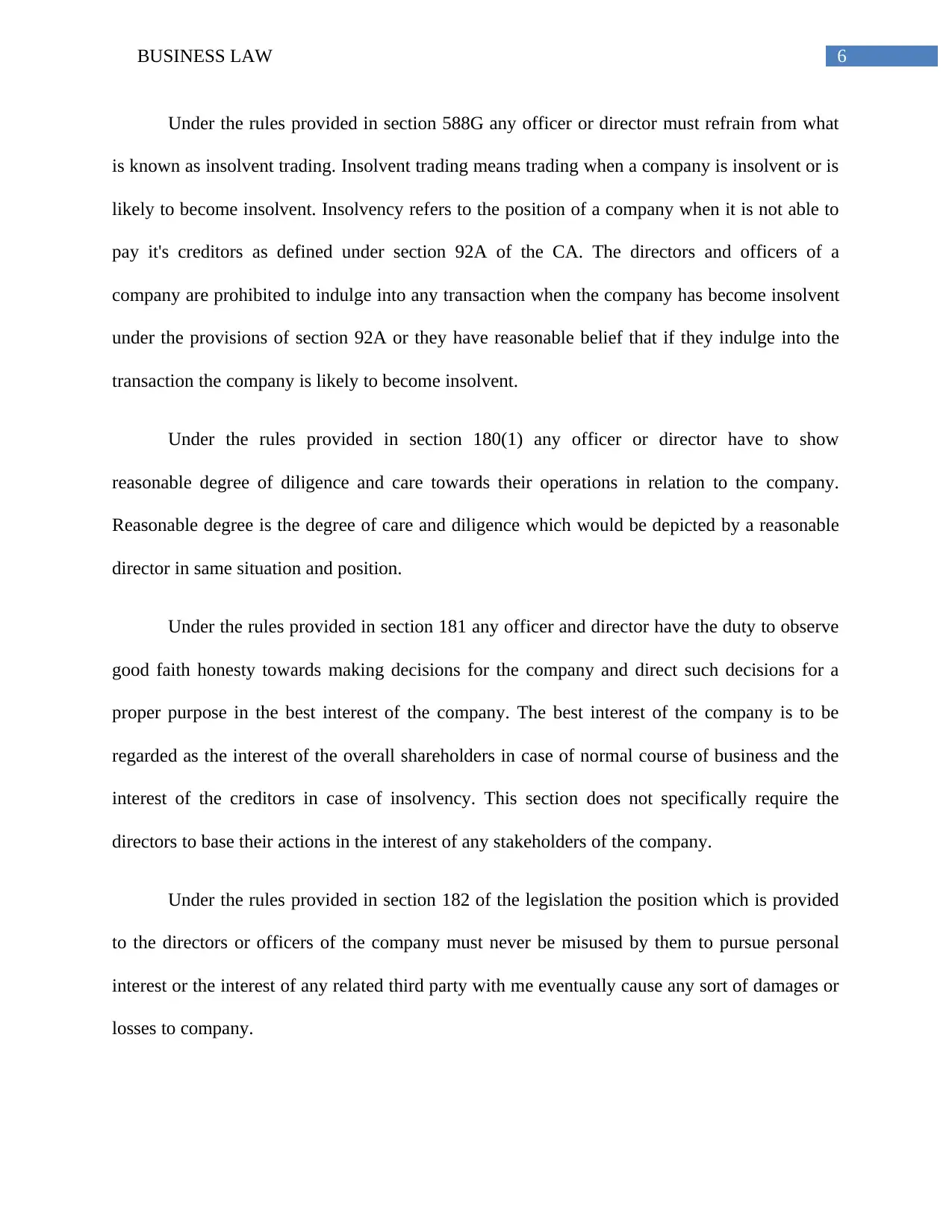
6BUSINESS LAW
Under the rules provided in section 588G any officer or director must refrain from what
is known as insolvent trading. Insolvent trading means trading when a company is insolvent or is
likely to become insolvent. Insolvency refers to the position of a company when it is not able to
pay it's creditors as defined under section 92A of the CA. The directors and officers of a
company are prohibited to indulge into any transaction when the company has become insolvent
under the provisions of section 92A or they have reasonable belief that if they indulge into the
transaction the company is likely to become insolvent.
Under the rules provided in section 180(1) any officer or director have to show
reasonable degree of diligence and care towards their operations in relation to the company.
Reasonable degree is the degree of care and diligence which would be depicted by a reasonable
director in same situation and position.
Under the rules provided in section 181 any officer and director have the duty to observe
good faith honesty towards making decisions for the company and direct such decisions for a
proper purpose in the best interest of the company. The best interest of the company is to be
regarded as the interest of the overall shareholders in case of normal course of business and the
interest of the creditors in case of insolvency. This section does not specifically require the
directors to base their actions in the interest of any stakeholders of the company.
Under the rules provided in section 182 of the legislation the position which is provided
to the directors or officers of the company must never be misused by them to pursue personal
interest or the interest of any related third party with me eventually cause any sort of damages or
losses to company.
Under the rules provided in section 588G any officer or director must refrain from what
is known as insolvent trading. Insolvent trading means trading when a company is insolvent or is
likely to become insolvent. Insolvency refers to the position of a company when it is not able to
pay it's creditors as defined under section 92A of the CA. The directors and officers of a
company are prohibited to indulge into any transaction when the company has become insolvent
under the provisions of section 92A or they have reasonable belief that if they indulge into the
transaction the company is likely to become insolvent.
Under the rules provided in section 180(1) any officer or director have to show
reasonable degree of diligence and care towards their operations in relation to the company.
Reasonable degree is the degree of care and diligence which would be depicted by a reasonable
director in same situation and position.
Under the rules provided in section 181 any officer and director have the duty to observe
good faith honesty towards making decisions for the company and direct such decisions for a
proper purpose in the best interest of the company. The best interest of the company is to be
regarded as the interest of the overall shareholders in case of normal course of business and the
interest of the creditors in case of insolvency. This section does not specifically require the
directors to base their actions in the interest of any stakeholders of the company.
Under the rules provided in section 182 of the legislation the position which is provided
to the directors or officers of the company must never be misused by them to pursue personal
interest or the interest of any related third party with me eventually cause any sort of damages or
losses to company.
Paraphrase This Document
Need a fresh take? Get an instant paraphrase of this document with our AI Paraphraser
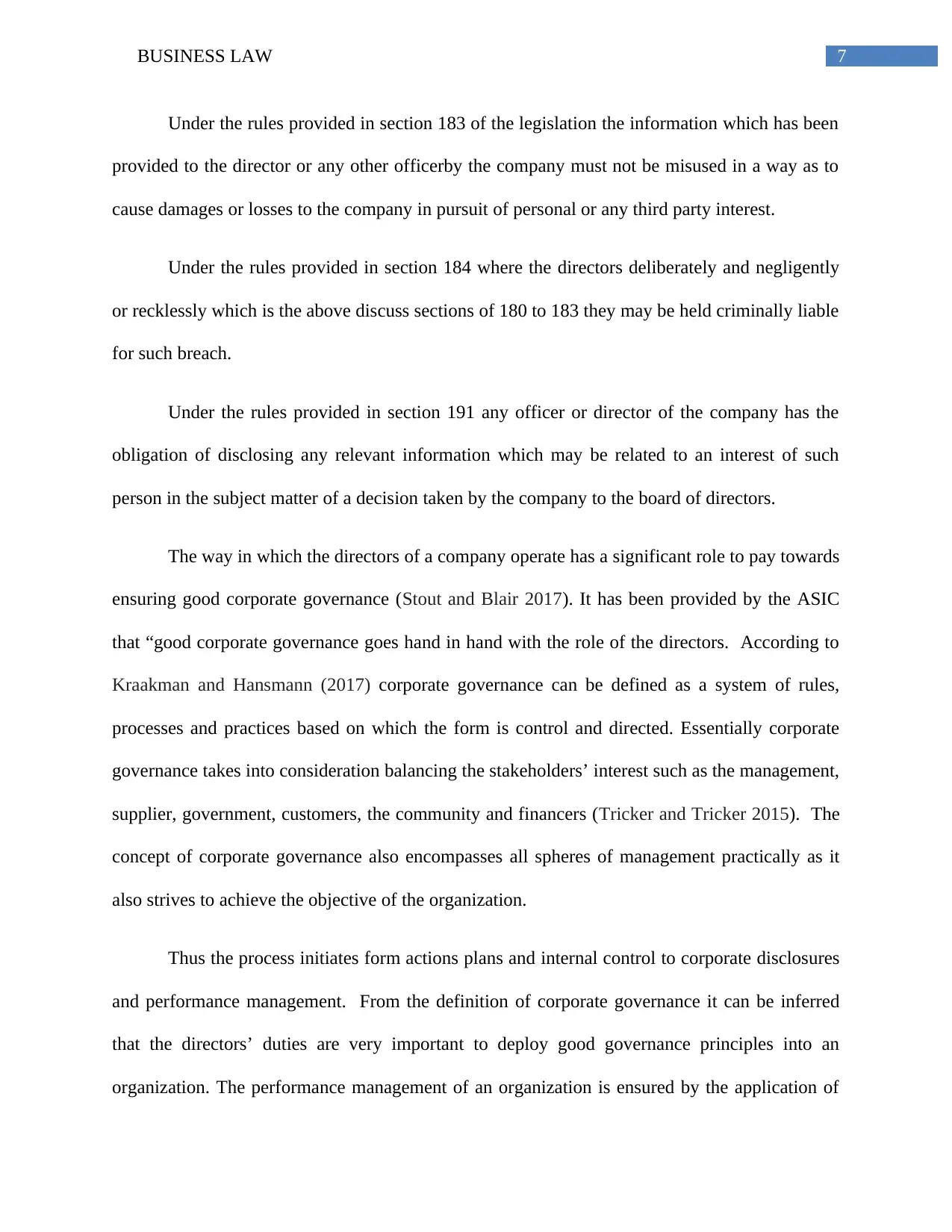
7BUSINESS LAW
Under the rules provided in section 183 of the legislation the information which has been
provided to the director or any other officerby the company must not be misused in a way as to
cause damages or losses to the company in pursuit of personal or any third party interest.
Under the rules provided in section 184 where the directors deliberately and negligently
or recklessly which is the above discuss sections of 180 to 183 they may be held criminally liable
for such breach.
Under the rules provided in section 191 any officer or director of the company has the
obligation of disclosing any relevant information which may be related to an interest of such
person in the subject matter of a decision taken by the company to the board of directors.
The way in which the directors of a company operate has a significant role to pay towards
ensuring good corporate governance (Stout and Blair 2017). It has been provided by the ASIC
that “good corporate governance goes hand in hand with the role of the directors. According to
Kraakman and Hansmann (2017) corporate governance can be defined as a system of rules,
processes and practices based on which the form is control and directed. Essentially corporate
governance takes into consideration balancing the stakeholders’ interest such as the management,
supplier, government, customers, the community and financers (Tricker and Tricker 2015). The
concept of corporate governance also encompasses all spheres of management practically as it
also strives to achieve the objective of the organization.
Thus the process initiates form actions plans and internal control to corporate disclosures
and performance management. From the definition of corporate governance it can be inferred
that the directors’ duties are very important to deploy good governance principles into an
organization. The performance management of an organization is ensured by the application of
Under the rules provided in section 183 of the legislation the information which has been
provided to the director or any other officerby the company must not be misused in a way as to
cause damages or losses to the company in pursuit of personal or any third party interest.
Under the rules provided in section 184 where the directors deliberately and negligently
or recklessly which is the above discuss sections of 180 to 183 they may be held criminally liable
for such breach.
Under the rules provided in section 191 any officer or director of the company has the
obligation of disclosing any relevant information which may be related to an interest of such
person in the subject matter of a decision taken by the company to the board of directors.
The way in which the directors of a company operate has a significant role to pay towards
ensuring good corporate governance (Stout and Blair 2017). It has been provided by the ASIC
that “good corporate governance goes hand in hand with the role of the directors. According to
Kraakman and Hansmann (2017) corporate governance can be defined as a system of rules,
processes and practices based on which the form is control and directed. Essentially corporate
governance takes into consideration balancing the stakeholders’ interest such as the management,
supplier, government, customers, the community and financers (Tricker and Tricker 2015). The
concept of corporate governance also encompasses all spheres of management practically as it
also strives to achieve the objective of the organization.
Thus the process initiates form actions plans and internal control to corporate disclosures
and performance management. From the definition of corporate governance it can be inferred
that the directors’ duties are very important to deploy good governance principles into an
organization. The performance management of an organization is ensured by the application of
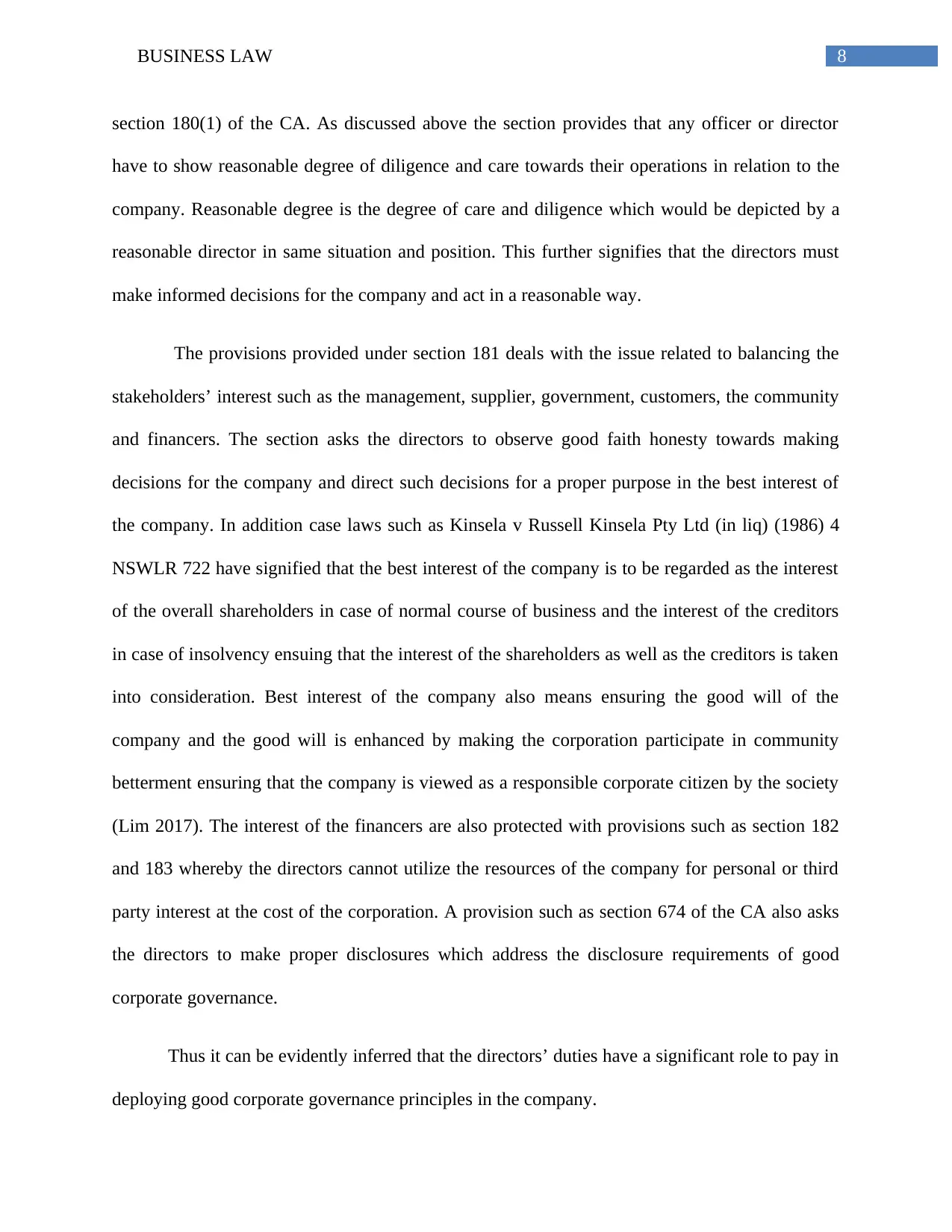
8BUSINESS LAW
section 180(1) of the CA. As discussed above the section provides that any officer or director
have to show reasonable degree of diligence and care towards their operations in relation to the
company. Reasonable degree is the degree of care and diligence which would be depicted by a
reasonable director in same situation and position. This further signifies that the directors must
make informed decisions for the company and act in a reasonable way.
The provisions provided under section 181 deals with the issue related to balancing the
stakeholders’ interest such as the management, supplier, government, customers, the community
and financers. The section asks the directors to observe good faith honesty towards making
decisions for the company and direct such decisions for a proper purpose in the best interest of
the company. In addition case laws such as Kinsela v Russell Kinsela Pty Ltd (in liq) (1986) 4
NSWLR 722 have signified that the best interest of the company is to be regarded as the interest
of the overall shareholders in case of normal course of business and the interest of the creditors
in case of insolvency ensuing that the interest of the shareholders as well as the creditors is taken
into consideration. Best interest of the company also means ensuring the good will of the
company and the good will is enhanced by making the corporation participate in community
betterment ensuring that the company is viewed as a responsible corporate citizen by the society
(Lim 2017). The interest of the financers are also protected with provisions such as section 182
and 183 whereby the directors cannot utilize the resources of the company for personal or third
party interest at the cost of the corporation. A provision such as section 674 of the CA also asks
the directors to make proper disclosures which address the disclosure requirements of good
corporate governance.
Thus it can be evidently inferred that the directors’ duties have a significant role to pay in
deploying good corporate governance principles in the company.
section 180(1) of the CA. As discussed above the section provides that any officer or director
have to show reasonable degree of diligence and care towards their operations in relation to the
company. Reasonable degree is the degree of care and diligence which would be depicted by a
reasonable director in same situation and position. This further signifies that the directors must
make informed decisions for the company and act in a reasonable way.
The provisions provided under section 181 deals with the issue related to balancing the
stakeholders’ interest such as the management, supplier, government, customers, the community
and financers. The section asks the directors to observe good faith honesty towards making
decisions for the company and direct such decisions for a proper purpose in the best interest of
the company. In addition case laws such as Kinsela v Russell Kinsela Pty Ltd (in liq) (1986) 4
NSWLR 722 have signified that the best interest of the company is to be regarded as the interest
of the overall shareholders in case of normal course of business and the interest of the creditors
in case of insolvency ensuing that the interest of the shareholders as well as the creditors is taken
into consideration. Best interest of the company also means ensuring the good will of the
company and the good will is enhanced by making the corporation participate in community
betterment ensuring that the company is viewed as a responsible corporate citizen by the society
(Lim 2017). The interest of the financers are also protected with provisions such as section 182
and 183 whereby the directors cannot utilize the resources of the company for personal or third
party interest at the cost of the corporation. A provision such as section 674 of the CA also asks
the directors to make proper disclosures which address the disclosure requirements of good
corporate governance.
Thus it can be evidently inferred that the directors’ duties have a significant role to pay in
deploying good corporate governance principles in the company.
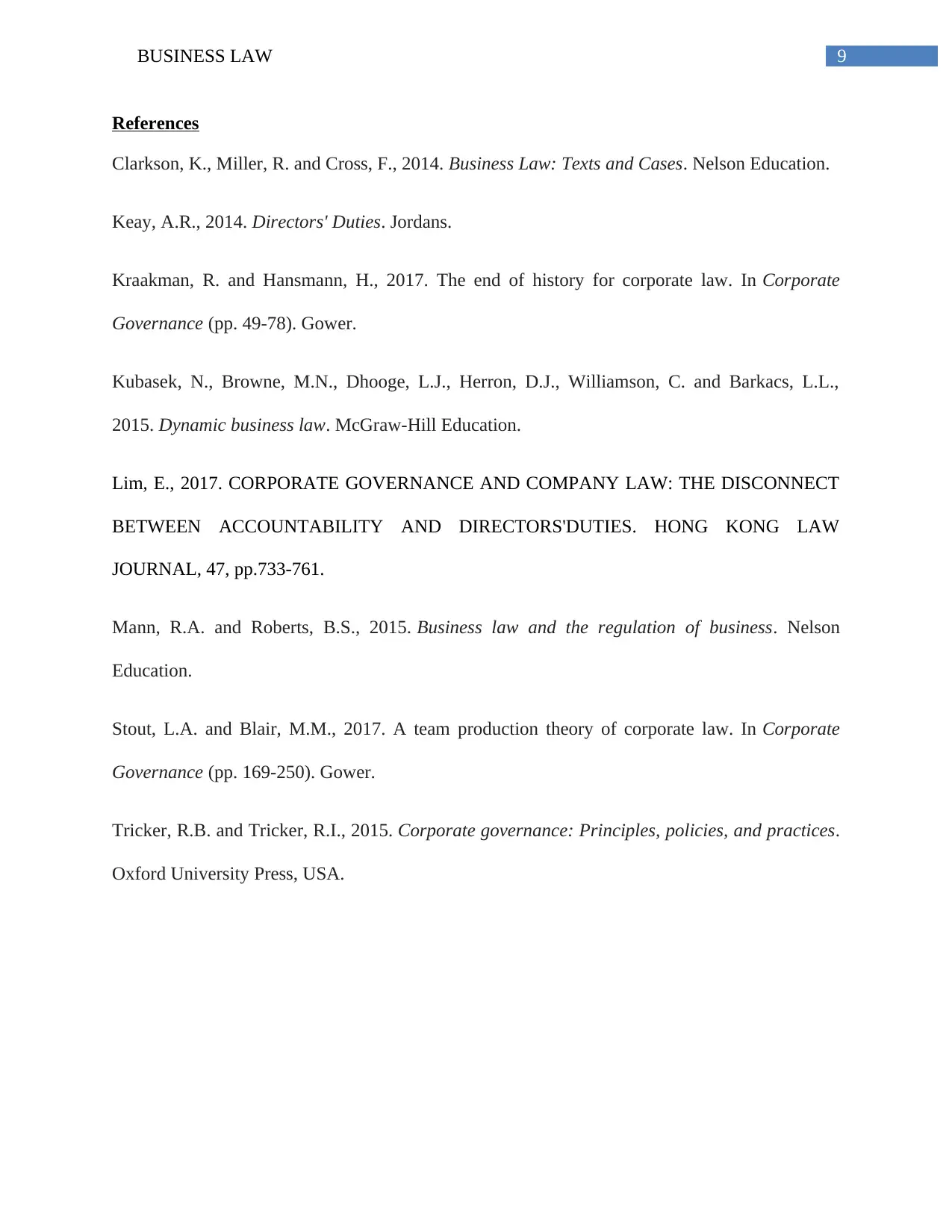
9BUSINESS LAW
References
Clarkson, K., Miller, R. and Cross, F., 2014. Business Law: Texts and Cases. Nelson Education.
Keay, A.R., 2014. Directors' Duties. Jordans.
Kraakman, R. and Hansmann, H., 2017. The end of history for corporate law. In Corporate
Governance (pp. 49-78). Gower.
Kubasek, N., Browne, M.N., Dhooge, L.J., Herron, D.J., Williamson, C. and Barkacs, L.L.,
2015. Dynamic business law. McGraw-Hill Education.
Lim, E., 2017. CORPORATE GOVERNANCE AND COMPANY LAW: THE DISCONNECT
BETWEEN ACCOUNTABILITY AND DIRECTORS'DUTIES. HONG KONG LAW
JOURNAL, 47, pp.733-761.
Mann, R.A. and Roberts, B.S., 2015. Business law and the regulation of business. Nelson
Education.
Stout, L.A. and Blair, M.M., 2017. A team production theory of corporate law. In Corporate
Governance (pp. 169-250). Gower.
Tricker, R.B. and Tricker, R.I., 2015. Corporate governance: Principles, policies, and practices.
Oxford University Press, USA.
References
Clarkson, K., Miller, R. and Cross, F., 2014. Business Law: Texts and Cases. Nelson Education.
Keay, A.R., 2014. Directors' Duties. Jordans.
Kraakman, R. and Hansmann, H., 2017. The end of history for corporate law. In Corporate
Governance (pp. 49-78). Gower.
Kubasek, N., Browne, M.N., Dhooge, L.J., Herron, D.J., Williamson, C. and Barkacs, L.L.,
2015. Dynamic business law. McGraw-Hill Education.
Lim, E., 2017. CORPORATE GOVERNANCE AND COMPANY LAW: THE DISCONNECT
BETWEEN ACCOUNTABILITY AND DIRECTORS'DUTIES. HONG KONG LAW
JOURNAL, 47, pp.733-761.
Mann, R.A. and Roberts, B.S., 2015. Business law and the regulation of business. Nelson
Education.
Stout, L.A. and Blair, M.M., 2017. A team production theory of corporate law. In Corporate
Governance (pp. 169-250). Gower.
Tricker, R.B. and Tricker, R.I., 2015. Corporate governance: Principles, policies, and practices.
Oxford University Press, USA.
1 out of 10
Related Documents
Your All-in-One AI-Powered Toolkit for Academic Success.
+13062052269
info@desklib.com
Available 24*7 on WhatsApp / Email
![[object Object]](/_next/static/media/star-bottom.7253800d.svg)
Unlock your academic potential
© 2024 | Zucol Services PVT LTD | All rights reserved.




